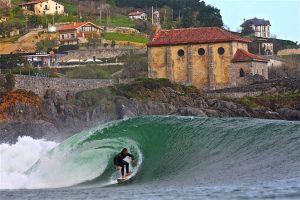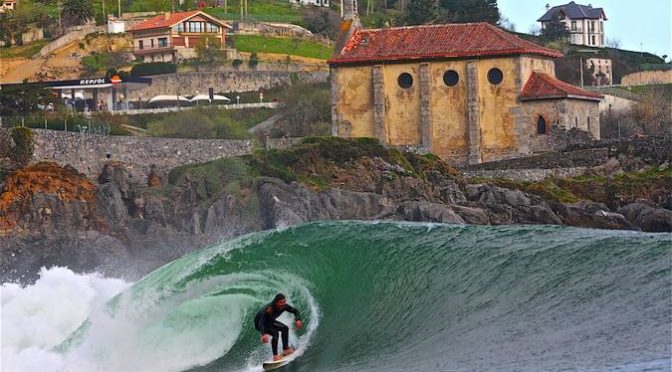Right next to Bermeo lies Mundaka. While we didn’t stop in Mundaka, we drove through it several times as we ventured into the heart of Bizkaia, particularly Munitibar. Sitting right on the coast, Mundaka sees the waves of the Atlantic crashing into its beaches, and because of the special geography of the seafloor, these waves have become famous for surfing. However, Mundaka has a history lost to time and legend, as it is said that the mythical first Lord of Bizkaia was born there.

- The oldest historical mention of Mundaka that we have is from January 30, 1051 in a document where Iñigo López, the Count of Vizcaya, granted the Bishop of Alava García some of his belongings, which included several estates in Mundaka. Because Mundaka is said to have the oldest temple in Bizkaia, it also has the first seat at the General Assembly of the province. Legend says that Jaun Zuria, the White Lord and first Lord of Bizkaia, was born in Mundaka, which might be another reason that Mundaka has the first seat.
- Later, Mundaka found itself at odds with Bermeo regarding jurisdiction of some ports. Mundaka and Bermeo also jointly contested the island of Izaro, the resolution of which is celebrated by the Madalenas fiesta.
- In the 17th century, because of the threat from first Dutch and then later French and English fleets (including that of Oliver Cromwell), the Señorío of Bizkaia began fortifying ports such as Mundaka. They also sent soldiers to help guard the ports.
- The origin of the name Mundaka has been lost to time. Some suggest it is of Norse or Scottish origin (Jaun Zuria was the son of a Scottish princess), and there is the possibility of a Viking settlement in the area from very early times. The Norse origin would lead to Mundaka meaning something like “mouth of the cape” while the Scottish one might suggest a Latin origin meaning “clean water.” A more Basque origin suggests it might mean “on the slope of a hill.”
- Mundaka borders the town of Bermeo and sits at the mouth of the Oka (Mundaka) river, with Laida on the other side.
- The town, since its founding, was devoted to fishing, but in recent times that has changed. There are no fishermen in Mundaka. Rather, today, tourism is the primary driver of the economy, with the population swelling by five times in the summer. This is driven, in part, by surfing. Mundaka is known for the Mundaka Wave. The estuary has a sandbar for forming waves that are ideal for surfing. At one time, Mundaka was one of the sites for the World Championship Tour of Surfing. However, the sandbar was damaged in 2005, seriously degrading the nature of the waves and the attractiveness of Mundaka for surfing. With time, the sea has rebuilt the sandbar and the Mundaka Wave is recovering.
Primary sources: Arozamena Ayala, Ainhoa. MUNDAKA. Auñamendi Encyclopedia. Available at: https://aunamendi.eusko-ikaskuntza.eus/en/mundaka/ar-99922/; Mundaka, Wikipedia


